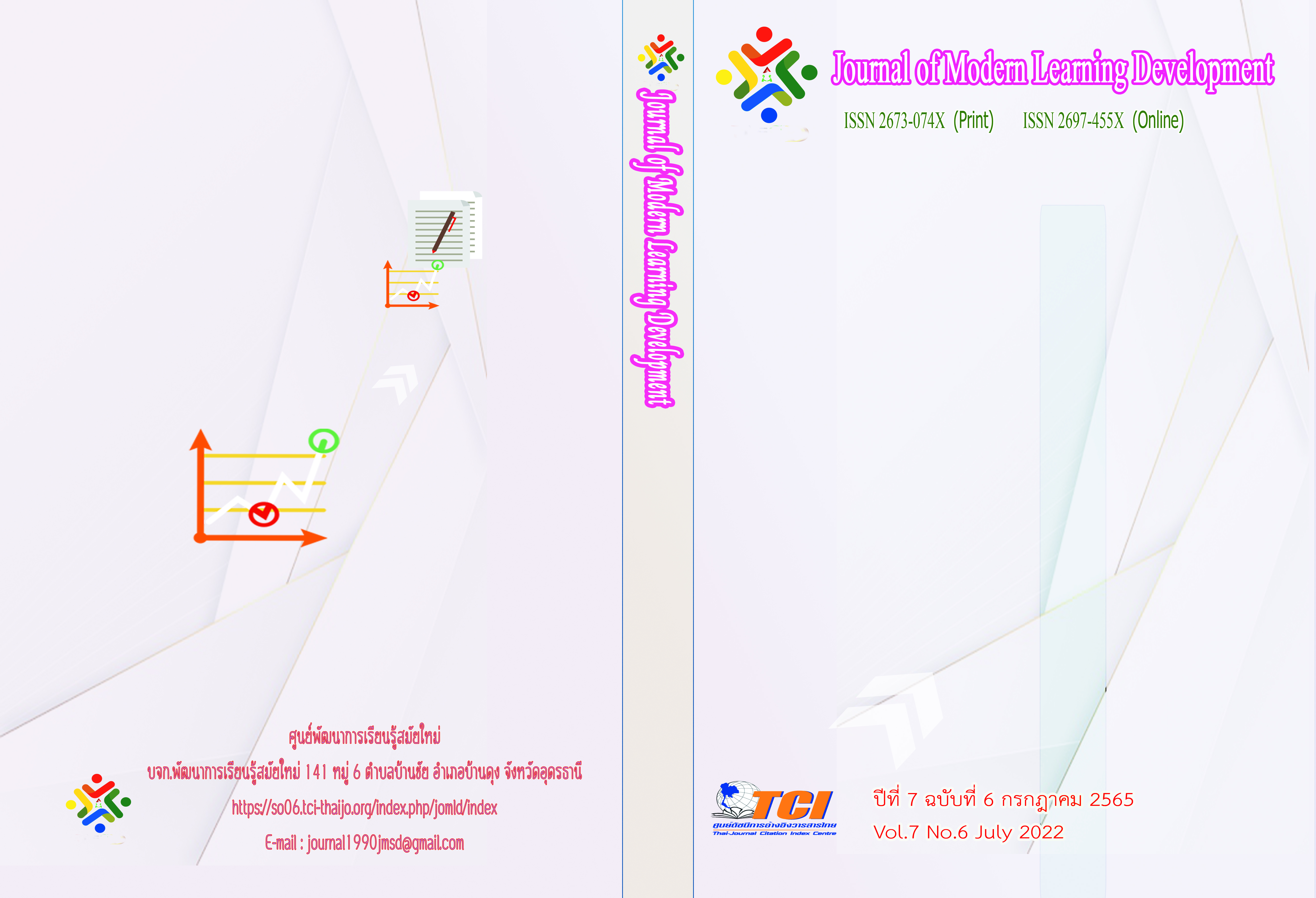Thai High School Students’ Reflections on Role-Play Activity in Thai EFL Speaking Class
Main Article Content
Abstract
The objective of this research was to examine the use of role play in the context of English speaking activities. Mathayomsuksa 4 students took part in this study, which included 75 of them. There were a questionnaire and a semi-structured interview used in this study as the research instruments. The data was examined and interpreted using the mean (x), and standard deviation (SD.) as well as content analysis from the interview interpretation. Using surveys and interviews, the researchers discovered that role-playing activity can benefit participants in terms of English speaking skills, vocabulary development. They also discovered that it can increase confidence and provide an opportunity to practice in everyday situations. The participants also expressed favorable feeling regarding the use of role play in the context of English speaking classes.
Article Details
References
Aik, C.T., & Tway, D.C. (2006). Elements and principles of training as a performance
improvement solution, Performance improvement. 45 (3), 28-32.
Al-Senaidi, S. A. (2009). Using role play to promote oral fluency, 66-72. In Borg. S.(Ed.),
Understanding English Language Teaching and Learning in Oman. Retrieved July
, 2012
Astuti, E. S. (2017). Students’ Perception Toward Role Play Activity in the ESP
Classroom. Paradigma: Jurnal Filsafat, Sains, Teknologi, dan Sosial Budaya, 23(2), 29-32.
Bojeeswari, D. (2013). The Effects of Role-Play on Students’ Attitude and Motivation to
Speak and Interact in the ESL Classroom. (Doctoral dissertation, Universiti Teknologi
Malaysia).
Budden, Joanna. (2004). “Role play”, British Council. Online. Retrieved from
http://www.teachenglish.org. uk/think/articles/role-play (date of access: 1 April 2013)
Elyildirim, S., & Ashton, S. (2006). Creating positive attitudes towards English as a foreign
language, English Teaching Forum. 44 (4), 2-11.
Feng Liu & Yun Ding (2009) “Role-play in English Language Teaching”, Asian Social
Science, 5(0)
Gibson, J.L., Ivanovich, J.M., & Donnely, J.H. (1985) Organizations: behavior, structure,
processes (5th ed.). Plano, TX: Business Publications.
Kowalska, Barbara. (1991). Let them talk in English. Warszawa: Wydawnictwo Szkolne i
Pedagogiczne
Krebt, D. M. (2017). The effectiveness of role play techniques in teaching speaking for EFL
college students. Journal of Language Teaching and Research, 8(5), 863.
Lara Castro, J., & Díaz Larenas, C. (2019). Students’ willingness to participate in speaking
activities through the use of scripted role-plays. Comunicación, 28(2), 71-86.
Littlewood, W. (1991). Communicative Language Teaching. United Kingdom: Oxford The
University Press.
Mat, A. C., Awang, A., Nokman, A. Z., Musilehat, N. S., Bakar, A. F. A., & Yusoff, M. S. A.
(2019). Investigating Attitude towards Role Play and Its Subjective Value in Predicting
Arabic Language Proficiency among UiTM Students. International Journal of
Education and Practice, 7 (4), 334-346.
Naksevee, N., & Sinwongsuwat, K. (2014). Non-scripted role-play: A better practice for Thai
EFL college students’ speaking skills. The TFLTA Journal, 5, 80-91.
Nguyen, H. B., & Do, N. N. T. (2017). Students’ Attitudes Towards Drama-Based Role Play
in Oral Performance. European Journal of Foreign Language Teaching.
Paradewari, D. S. (2015). ELESP Students’ Perception on the Use of Scripted Role Play to
Improve Speaking Ability in Play Performance Class (Doctoral dissertation, SANATA DHARMA UNIVERSITY).
Porter-Ladousse, Gillian. (1987). Role play. Oxford: Oxford University Press.
Rahayu Nur Safitri, S. E. L. V. I. N. A. (2019). Students’ Perception on the use of role play
by the Teacher in EFL Classroom (Doctoral dissertation, Universitas Siliwangi).
Saetan, K. (1991). The Effect of Role-play on Students’ Self-Confidence in Using English for
Communication. MA thesis, King Mongkut’s University of Technology Thonburi,
Bangkok.
Tompkins, P.K. (2001). The Role Playing. Simulation. (TESL, Vo IV No 8, Agues. P4).


